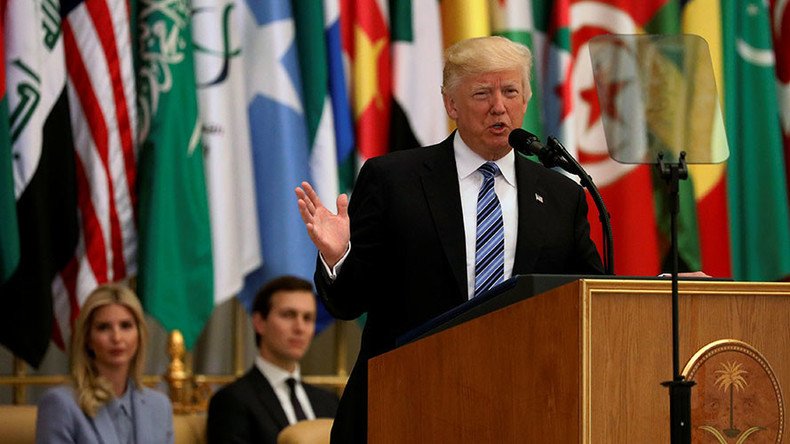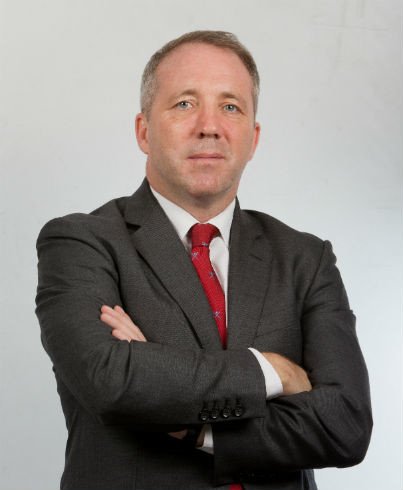Trump talks tough on extremism in Middle East - but it's guns, oil, and money that matter

Donald Trump portrays himself as a rebel, but in the marquee speech of his Saudi Arabian visit yesterday he displayed once again that he will not betray the fundamental doctrines of the US establishment.
The United States must have oil, sell weapons and pursue non-nuclear conflict to keep the All-American money-making show on the road. Once these bases are covered, and business isn’t affected the US president can get away with almost anything.
That is until you’re impeached for indiscretions at home. Trump’s troubles over his sacking of FBI chief James Comey will take time to play out.
So he took advantage of the traditional presidential method of getting a break from criticism and stress at home - A foreign visit to lap up the adulation from a compliant ally. Where better to start than Saudi Arabia? That autocratic state is one of America’s best international allies.
His wife Melania was with him – she only accompanies him on the most important events.
The most anticipated event was an address to the leaders of 55 Arab majority countries at the Arab-Islamic-American summit in the Saudi capital Riyadh on Sunday. There he talked tough, but not too tough. President Trump may be making significant errors at home, but he didn’t put a foot wrong in Saudi Arabia during his first visit abroad.
He was given the rare honor of being greeted at Riyadh airport by King Salman.
Great to be in Riyadh, Saudi Arabia. Looking forward to the afternoon and evening ahead. #POTUSAbroadpic.twitter.com/JJOra0KfyR
— Donald J. Trump (@realDonaldTrump) May 20, 2017
Having flown overnight from the United States he touched down on Saturday morning, and the 70-year-old was straight into a 13-hour working day.
At a ceremony in the royal court, the king placed the Order of Abdulaziz Al Saud medal, the nation’s highest civilian honor, around Trump’s neck. The medal has also been bestowed on his predecessor, Barack Obama, Russian President Vladimir Putin, and British Prime Minister Theresa May.
The king and president were overheard discussing natural resources and arms, and the king bemoaned the destruction caused by Syria’s civil war.
The important business of the visit a $100 billion ($350 billion over 10 years) arms deal with Saudi Arabia was quickly sealed. That will create jobs in the US, which will keep his supporters happy at home and keep his Saudi Arabian allies armed to the teeth.
Once that was done all we had to see, on the second day, was whether President Trump could perform the rhetorical equivalent of using the correct cutlery at the dinner table. Trump may be brash, impetuous, and sometimes reckless but he is no fool. And this is what angers his opponents so much. He makes mistakes but not fatal ones (at least not yet). He performed well here, didn’t insult anybody and drove home the old strategic preferences of the United States.
Trump had come to power calling for a ban on Muslims entering the US and telling his supporters that "Islam hates us."
He slammed Obama for refusing to use the phrase "radical Islamic terrorism."
President Trump repeatedly used that phrase during the campaign last year. As recently as Wednesday, in a speech at the US Coast Guard Academy, Mr. Trump said: "We have to stop radical Islamic terrorism."
Such a generalization causes great offense in the Middle East.
President Trump’s foreign affairs advisers counseled that a repeat would cause mayhem. Worse it could jeopardize future arms deals and oil trade. So he didn’t use it.
He did call on Muslim leaders across the globe to confront the "crisis of Islamic extremism."
In the speech he also stressed the need to combat "the crisis of Islamic extremism and the Islamists and Islamic terror of all kinds."
Not a huge difference to many Western listeners, but that’s what diplomacy is about.
President Donald Trump embodies a supercharged, no frills version of the United States. He brought all the loves and prejudices of the heartland America out into the open. He talks about making America great again and he wants to appear tough on Islamic terrorism. With these aims comes a lot of rhetoric that can be bigoted and racist. But these aims are ultimately about making money. And the billionaire understands money.
Money plays the pivotal role in US/Middle Eastern alliances.
These are the basic tenets of US Middle East policy, they are worth stating to understand fully Trump’s address to the Arab leaders yesterday.
#Trump & 55 Muslim-majority states sign pact pledging 34,000 troops to fight #ISIS in Iraq & Syria https://t.co/u2bt219GTdpic.twitter.com/pMc28YDHDa
— RT (@RT_com) 22 мая 2017 г.
Firstly, after the Second World War, along with Britain, and mostly for naïve altruistic reasons, the United States was most responsible for helping set up the state of Israel. And they’ve stuck by Israel through thick and thin since its foundation in 1948.
The US conducts $35 billion a year of trade with Israel.
The United States recently completed a $38 billion dollar arms deal with Israel, and after the United Arab Emirates and Saudi Arabia, it is America’s third largest weapons’ customer.
And no US president or presidential candidate will survive opposing the pro-Israel lobby in the United States. Trump wants to survive politically.
Since the Shah of Iran was overthrown in 1979 Iran has vowed to continue the revolution by obliterating Israel and opposing its ‘Crusader’ US supporters. Iran supports Hezbollah, which threatens Israel from the Palestinian territories and other Middle Eastern states. So since 1979, the US has opposed Iran. To oppose a massive power like Iran, you need further allies in the Middle East. And despite many of the 9/11 attackers coming from Saudi Arabia, the US has grown closer to that country over the last two decades.
Conveniently Saudi Arabia has the world’s second largest oil reserves – 268,300,000 barrels (first is Venezuala, considered a Communist rogue state by the US).
ISIS (Islamic State) in its various guises continues to destabilize what was supposed to be a stable new US ally in the Middle East, Iraq. And the tragedy in Syria contributed to by ISIS and others continues to destabilize the region. So ISIS must be obliterated.
As investigative journalist Max Blumenthal points out elsewhere in RT op-edge, the “American Empire sees Saudi Arabia as its bulwark” against Iran and others in the region.
‘Sucking up to Saudis is long US tradition, every president does it’ (Op-Edge) https://t.co/ut1Ny3ew8Xhttps://t.co/rH9km0XB4Apic.twitter.com/RLm6PaihXk
— RT (@RT_com) 21 мая 2017 г.
President Trump yesterday said, “let me now also extend my deep and heartfelt gratitude to each and every one of the distinguished heads of state who made this journey here today.” The head of state of Iran was not among them.
And when he said America “will not seek to impose our way of life on others” he meant countries like Saudi Arabia. He did not mean Iraq, which over a million people have died during US efforts to do just that. And he did not mean Syria where the US continues to intervene.
In the speech to Arab leaders he said that America’s goal “is a coalition of nations who share the aim of stamping out extremism and providing our children a hopeful future that does honor to God."
It depends on what your definition of extremism is, as the Saudi Arabia state is a strict adherent to Sharia law. In Saudi Arabia, the death penalty can be imposed for a wide range of offenses including murder, rape and armed robbery. But lesser and more obscure ‘offenses’ that are punishable by death include ‘witchcraft’ and ‘sorcery.'
Death sentences can be carried out by beheading with a sword, stoning or firing squad. Crucifixion is an option. Homosexual acts are punishable by flogging, imprisonment or death.
Saudi Arabia is a brutal, vicious police state so court rooms routinely rubber stamp convictions without proper trial.
And when he said in Riyadh that the aim of those assembled should be “providing our children a hopeful future” it is safe to assume he was referring only to male children. Saudi Arabia forbids women from obtaining a passport, marrying, or traveling abroad without the approval of a male guardian, usually a husband, father, brother, or son.
They are not even allowed to drive a car.
Saudi Arabia has been indiscriminately bombing Yemeni civilians for 18 months in a long running intervention.
#Trump should discuss avoiding ‘the likes of new 9/11’ while in Saudi Arabia – Iran FM https://t.co/3Sus03bWNPpic.twitter.com/yqZdnr9xEI
— RT (@RT_com) 21 мая 2017 г.
When Trump says he wants to fight Islamic terror he means opposing terror that threatens US allies, interests and business. He did not mean terror of the state institutionalized kind that is practiced in Saudi Arabia. Or Saudi Arabia’s terror campaign in Yemen.
And that hypocrisy extends universally when it comes to Saudi Arabia, which is so oil rich and strategically important to Western interests.
Shockingly Saudi was recently re-elected to the Human Rights Council of the United Nations.
And laughably it was voted to serve on the UN Commission on the Status of Women. No laughing matter if you’re a woman. Then again this won’t worry President Trump, who was recorded boasting about groping women.
Unlike his predecessor, Barack Obama, this US president made no mention of human rights or democracy.
President Obama, a Democrat, was less of an adherent to establishment tenets. He was thawing the US-Iran freeze, but Trump has reversed that.
Yesterday Trump singled out Iran for criticism, accusing it of fueling sectarian conflict and supporting "unspeakable crimes" by the government of President Bashar Assad in Syria.
The speech was full of black and white Trumpisms - "This is a battle between good and evil."
And the apocalyptic language favored by his speech writers "Drive them [terrorists] out of this earth."
He implored the favored leaders to join the US in its selective crusades; “With God’s help, this summit will mark the beginning of the end for those who practice terror and spread its vile creed.”
Rhetoric reassures your allies and threatens your enemies. It reinforces your stance, and in Trump’s case, while roared into a microphone, it tells those two groups where they stand with a phenomenon who is still an unknown quantity to many.
Yet as the Arab leaders looked closely they will have seen that this rebel is more establishment than many believe. Trump was re-establishing the ancien regime order after Obama’s dalliances with Iran and criticisms of Saudi Arabia. And he was reassuring those that America needs in the Middle East that business with America is back where it should be – booming.
He made sure his Arab friends knew that a lot of what was said last year was just election talk. Things remain on track in the Middle East for Trump, though they may unravel at home before he returns again.
Now it’s on to meet Pope Frances in Rome. Since the Vatican doesn’t need American weapons he may find he is in for a tougher time there.
The statements, views and opinions expressed in this column are solely those of the author and do not necessarily represent those of RT.













